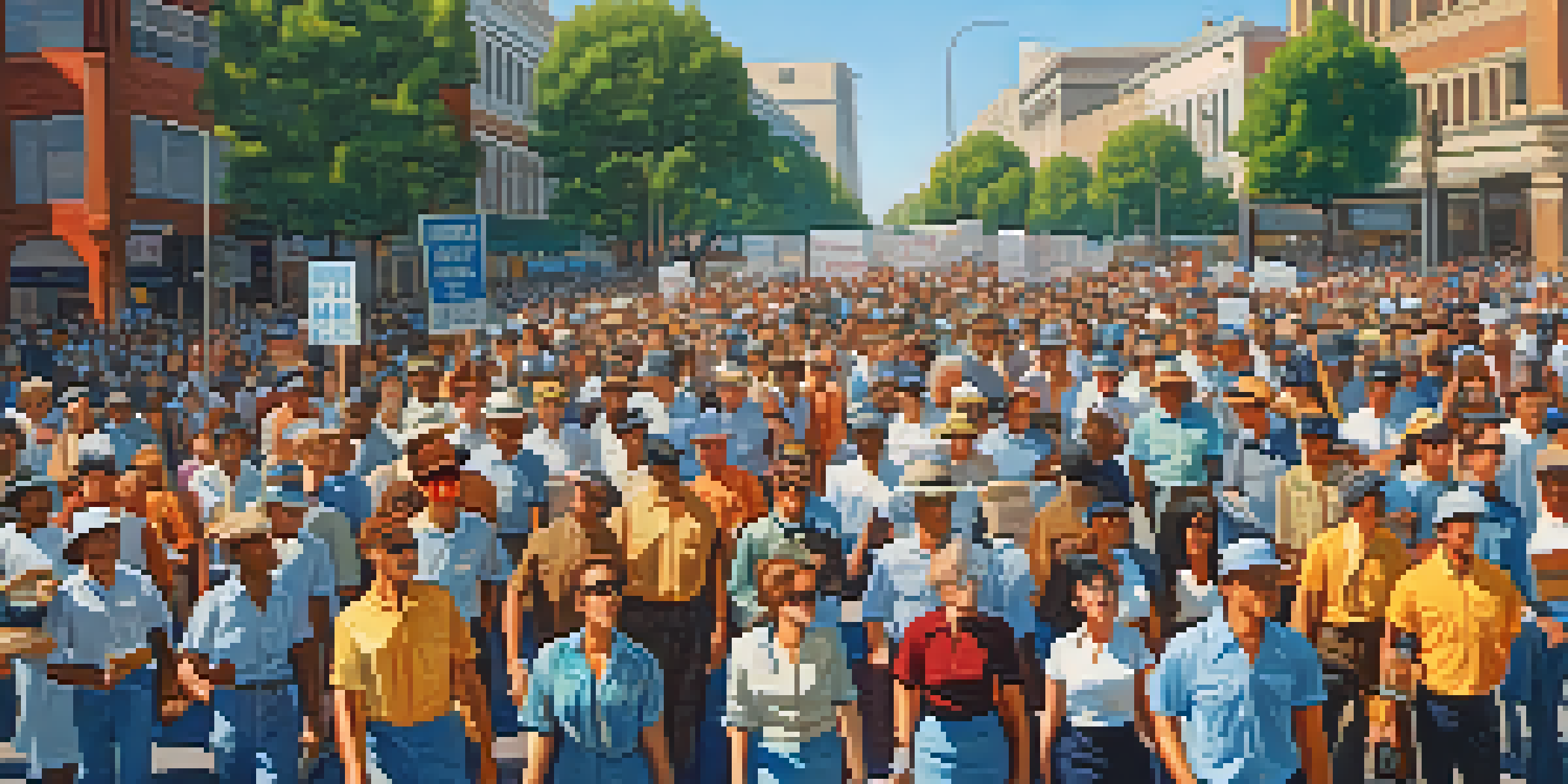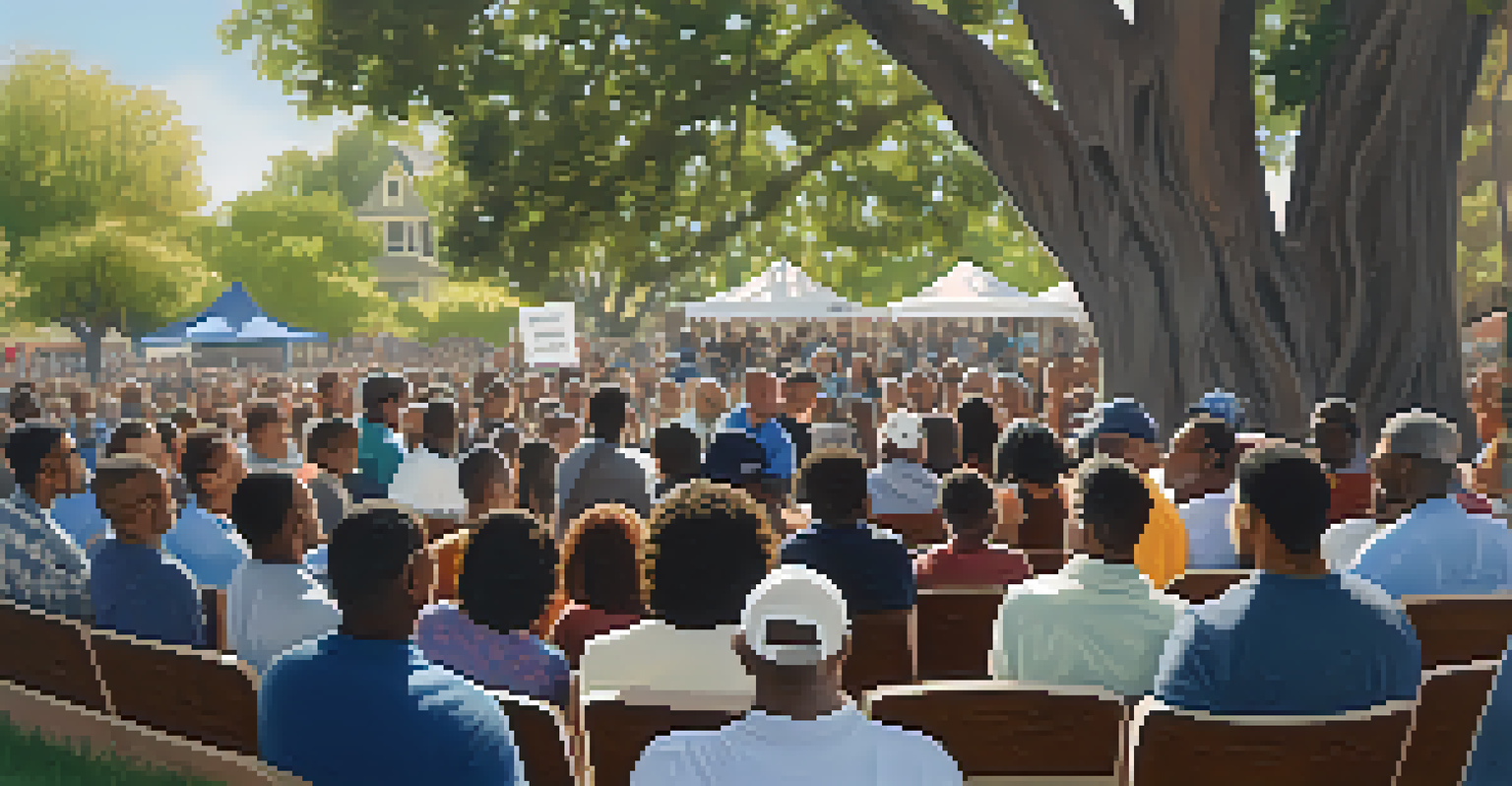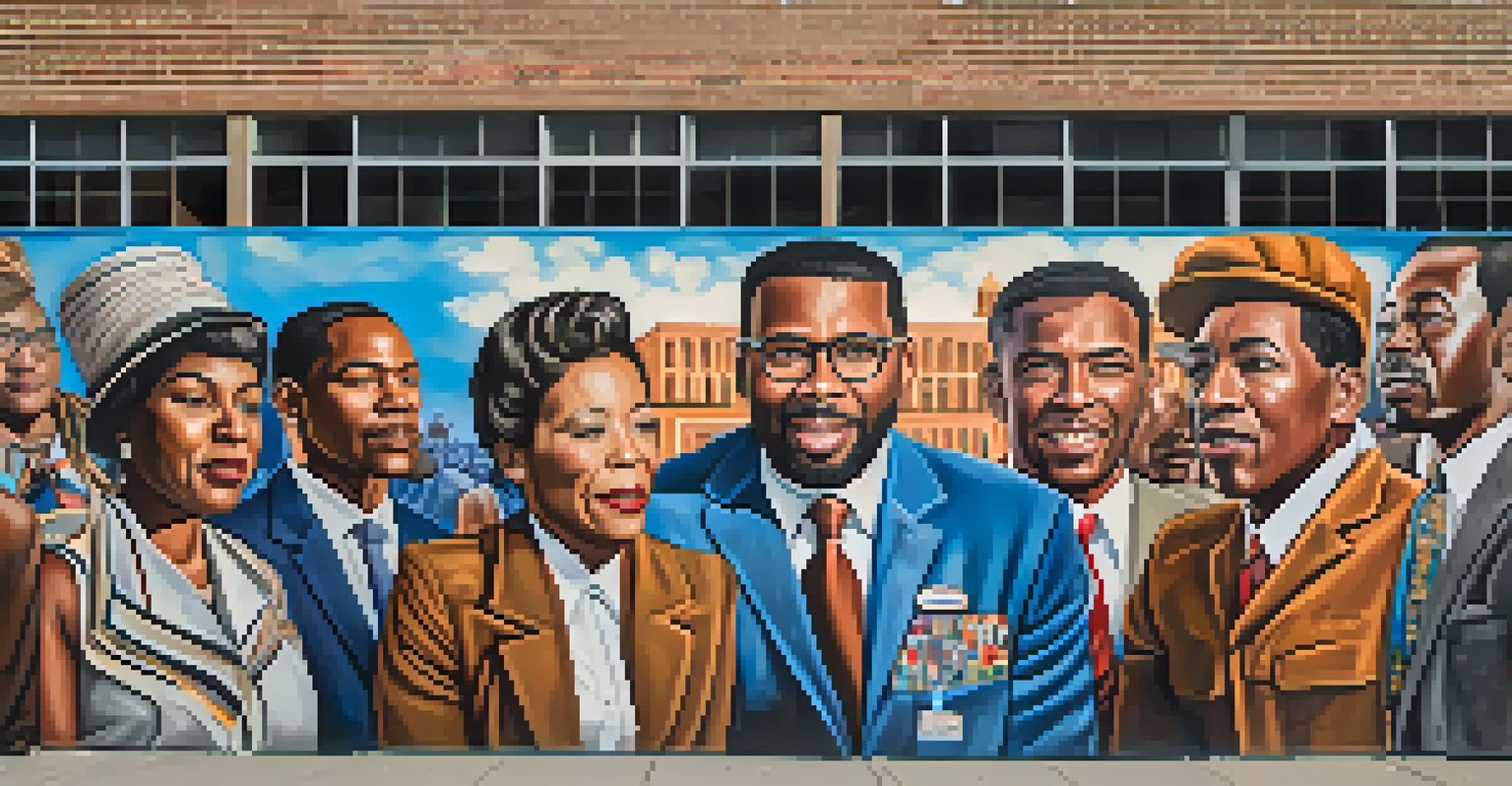Sacramento's Role in the Civil Rights Movement

The Roots of Civil Rights Activism in Sacramento
Sacramento's journey in the Civil Rights Movement began in the 1940s and 1950s, when local activists started advocating for racial equality. Influential figures like Dr. Kenneth B. Smith and community organizations laid the groundwork for future protests and campaigns. These early efforts were crucial in raising awareness about systemic racism and discrimination faced by African Americans in the region.
Injustice anywhere is a threat to justice everywhere.
The city's diverse population provided a rich tapestry of voices calling for change. Through grassroots organizing, residents began to unite around common goals such as desegregation, voting rights, and fair employment practices. This sense of community was vital in creating a formidable front against injustice, paving the way for larger, more organized movements.
Sacramento's unique position as a state capital also played a role in amplifying local voices. Activists recognized that by targeting political leaders and institutions, they could effect real change not just locally, but state-wide. This strategic focus set Sacramento apart as a key player in the broader Civil Rights Movement.
Key Events That Shaped the Movement in Sacramento
One of the landmark events in Sacramento's Civil Rights history was the 1963 march for jobs and freedom. Drawing thousands of participants, this march showcased the community's determination to fight for economic justice and equality. It resonated with national movements, echoing the sentiments of the famous March on Washington that same year.

Another significant moment was the formation of the Sacramento chapter of the NAACP, which worked tirelessly to address issues like discriminatory housing practices and unequal educational opportunities. Their advocacy led to important legal battles that challenged segregation and discrimination in various public sectors.
Early Activism Laid Groundwork
Sacramento's Civil Rights Movement began in the 1940s and 1950s, with activists raising awareness about racial discrimination and advocating for equality.
Additionally, the protests against police brutality in the late 1960s marked a turning point in community activism. These protests highlighted the urgent need for reform and accountability, uniting diverse groups in a common cause that underscored the ongoing struggle for equality.
Influential Leaders of Sacramento's Civil Rights Movement
Several key figures emerged as leaders in Sacramento's Civil Rights Movement, each contributing uniquely to the cause. One such leader was Dr. William Lee, who tirelessly advocated for educational reform and community empowerment. His work not only inspired many but also laid the foundations for future generations of activists.
Education is the most powerful weapon which you can use to change the world.
Another prominent figure was Betty Williams, who played a vital role in organizing protests and mobilizing the community. Her passion and dedication were infectious, rallying people from all walks of life to join in the fight for civil rights. Williams' leadership skills helped forge strong alliances among various community groups.
These leaders, along with countless unsung heroes, formed a network of support that was instrumental in pushing for systemic change. Their collective efforts demonstrated the power of unity and resilience in the face of adversity, reminding us that every voice matters in the fight for justice.
The Role of Education in Promoting Civil Rights
Education played a crucial role in advancing the Civil Rights Movement in Sacramento. Activists recognized that knowledge was power, and they tirelessly worked to educate the community about their rights and the importance of civic engagement. Workshops, seminars, and community meetings became vital platforms for sharing information and strategies.
Schools also became battlegrounds for civil rights. Efforts to desegregate schools highlighted the disparities in educational opportunities for African American students. Activists pushed for equitable funding and resources, advocating for an education system that treated all students with respect and dignity.
Key Events Sparked Change
Landmark events like the 1963 march for jobs and freedom and the formation of the NAACP chapter were pivotal in uniting the community and addressing systemic injustices.
The impact of these educational initiatives extended beyond the classroom. By empowering individuals with knowledge, Sacramento's activists created a more informed citizenry ready to engage in the fight for equality. This focus on education ensured that the lessons of the Civil Rights Movement would resonate for generations to come.
Sacramento's Cultural Contributions to the Movement
Art and culture were powerful tools for expression during the Civil Rights Movement in Sacramento. Local artists and musicians used their talents to raise awareness and inspire action, creating works that reflected the struggles and aspirations of the community. Their contributions helped to humanize the movement, making the fight for justice relatable and urgent.
The music scene, in particular, flourished during this time, with genres like jazz and gospel serving as backdrops for activism. Concerts and performances became platforms for fundraising and mobilization, uniting people in a shared experience of hope and resilience. This cultural richness added depth to the movement and attracted wider audiences.
Moreover, cultural events often featured speakers and activists who shared their stories, fostering a sense of solidarity and community pride. These gatherings helped to cultivate a vibrant activist culture that empowered individuals and reinforced the message of equality and justice.
Legislation and Policy Changes Influenced by Activism
Sacramento's Civil Rights Movement significantly influenced local and state legislation aimed at promoting equality. Activists' relentless advocacy efforts led to the passage of laws addressing discrimination in housing, employment, and public accommodations. These legislative changes reflected the community's demands for justice and paved the way for a more equitable society.
One notable achievement was the establishment of the Fair Employment Practices Commission. This body was created to investigate and address complaints of job discrimination, ensuring that individuals had a recourse against unfair practices. Such policies were instrumental in providing a framework for addressing systemic inequalities.
Legacy of Ongoing Activism
The impact of Sacramento's Civil Rights Movement continues today, inspiring modern efforts to combat inequality and honor the heroes of the past.
Additionally, the movement’s focus on voting rights led to increased voter registration efforts within the African American community. These initiatives empowered individuals to exercise their rights and participate fully in the democratic process, a vital step toward achieving true equality.
The Legacy of Sacramento's Civil Rights Movement Today
The legacy of Sacramento's involvement in the Civil Rights Movement continues to resonate today. The advocacy and activism of the past laid the groundwork for ongoing efforts to combat inequality and injustice in the community. Modern organizations often draw inspiration from the strategies and successes of their predecessors.
Today, discussions surrounding social justice and civil rights remain at the forefront of the community's consciousness. Local leaders, inspired by the movements of the past, work tirelessly to address contemporary issues such as police reform, affordable housing, and educational equity. This continuity of activism reflects the enduring impact of the Civil Rights Movement.

Moreover, the stories of Sacramento's civil rights heroes are increasingly being recognized and celebrated. Through educational programs, monuments, and cultural events, the community honors those who fought for justice, ensuring that the lessons from this pivotal time in history are not forgotten.